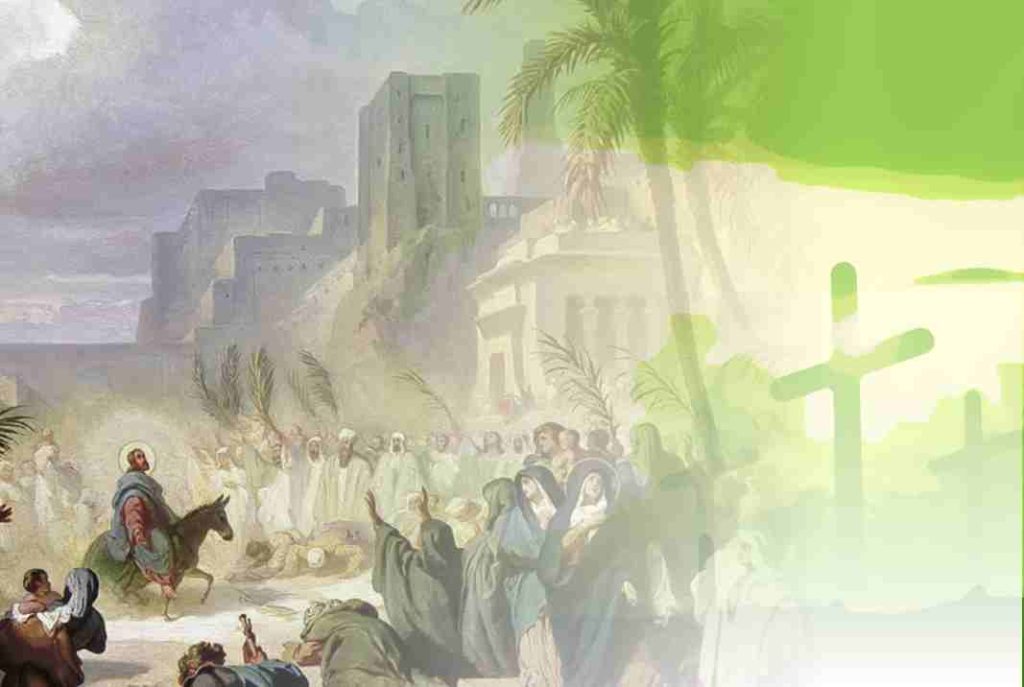Palm Sunday – Why Do We Remember?
Contributed By: Rev. Helen O. Harper
(Download Reflection)
(Download Full Sermon)
Rev. Harper is the Priest at St. Peter’s Episcopal Church in Niagara Falls. Today’s reflection is an edited version of her Palm Sunday sermon. A link to the full sermon is above. It is an excellent sermon and well worth reading.
I remember, while attending St. Ambrose Roman Catholic church and school in Brooklyn, New York, how much I looked forward to the Palm Sunday procession. This procession, which was carefully choreographed months in advance, consisted of incense, crosses, several priests, and nuns, all the altar boys, a choir singing hymns in Latin, followed by several hundred parishioners carrying palm branches walking 1 square block around the church.
Texts for Palm/Passion Sunday
Text for Liturgy of The Palms: Matthew 21:1-11
Test for Liturgy of The Passion:
Matthew 26:14-27:66
As much as I enjoyed the excitement and pageantry of this part of the liturgy, I pretty much dreaded what was coming next…the reading of the Passion Narrative, the story of the last days of Jesus Christ. Over the years I was foolish enough to devise what I thought was a clever way to “handle” hearing the content of the Passion Narrative. I convinced myself this reading would have less impact if I was simply prepared myself for what I was going to hear.
Now understand…this plan has never worked because I never been ready for the emotional and spiritual impact of the account of the last days of Jesus. The mood changes quickly after the sweet hosannas stop ringing in our ears, sort of like the strange sense of calm we often feel before a big storm. We find this day, Palm Sunday, is bittersweet because unlike the participants who came out to see Jesus as he rode into Jerusalem on that first Palm Sunday, we know how the story ends.
Every year we listen to the descriptions of the suffering and death of Jesus which all too soon casts a pall over our initial festive feelings and displays. We experience a roller coaster of emotions when we hear the story so…why remember? Why remember and reenact the mass gathering of the many pilgrims in Jerusalem who had come out that day, and in a time-honored act of welcome to royalty laid their robes on the ground. They also tore branches from the trees and began waiving them around, all in preparation for the man, at this point, considered a king.
Some historical accounts describe that first Palm Sunday as a carefully crafted political demonstration, an attempt by Jesus to put a stop to the corrupt dealings in the Temple, with their practices of money changing and other commercial activities that should not have been taking place within those sacred spaces. Perhaps this was a political move to try to elicit an indictment of the perpetrators.
“…we even secretly wonder if We had been there how would We have participated what would have been OUR role?…”
The priests, the Pharisees, the Sadducees, and the Scribes were all there too, on that day, watching Jesus as they had always had done, looking for a chance to make their move to put an end to Jesus whom they considered a troublemaker. As early in the story as Mark in Chapter 3: verse 6 says “The Pharisees went out and (they) immediately, conspired with the Herodians against (Jesus), and (they) planned how to destroy him.” The sight of these “Palm Sunday” festivities sent them into a frenzy.
As we listen closely to the events of this day and the coming week called Holy Week, we have questions: How could people have been so cruel against one who taught, fed, comforted the people, healed them, and raised their dead to life? Why did the disciples and Jesus’ faithful followers abandon Jesus when he needed them most? We cringe at the hypocrisy of the high priests, and we are repelled by the fickle words and ironic actions of the crowd who first expressed joy and welcome with their “Hosanna’s” then, within a very short time, betrayed Jesus with their bloodthirsty calls of “Crucify him, Crucify Him.”
In the Palm Sunday liturgy we see a man who refuses to abandon his trust in God. Rather Jesus used his death to defeat death, our death. The Gospels makes it clear that Jesus’ life was not taken from him. The Gospels tell us those who arrested, beat, tried, and crucified Jesus did not take his life, rather Jesus willingly gave up his life. Scripture tells us: “For the Son of Man came [to us]…to give up his life…[as]…a ransom for…[us the]…many.” (Mark 10:45, Matthew 20:28)

As we begin this week called Holy, we also begin remembering and re-enacting the various events of the last days and hours of Jesus. Whatever we do seems suspended in time, moments when over and over again we feel the shock, and experience the horror of human nature raw, exposed, and we cannot help but see ourselves within these stories. Once again we are astounded by what we hear and we even secretly wonder if We had been there how would We have participated, what would have been OUR role? During this week we might catch a glimpse of ourselves standing in the thick of the crowd shouting “Hosanna” to only later find ourselves on the sidelines in the shadows, allowing this heinous process to unfold realizing then, as now, it is dangerous to speak the truth in public.
And so…we remember. In the end the Passion Narrative is not scripture that we should, or even can, expect to “handle” easily, as I thought I could all those years ago back in Brooklyn. It is certainly scripture that we cannot ignore simply because it raises difficult truths about ourselves. The Passion Narrative is sacred drama which is to be experienced, explored, and entered into again and again, by we who dare to live our lives by events that have come to mean so much to us.
The Rev. Helen O. Harper Priest-in-Charge St. Peter’s Episcopal Church, Niagara Falls, NY

